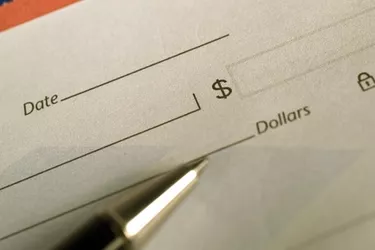
North Carolina law makes it a criminal offense to knowingly write a "worthless check." The state defines a worthless check as one written on an account that doesn't have sufficient funds to pay the check. The punishment for writing a bad check in North Carolina depends on several factors -- most significantly, the amount of the bad check.
Knowledge
Video of the Day
A key element in North Carolina's worthless-check statute is knowledge. For it to be a crime, you have to know that the check you are writing is going to bounce. If you made a mistake balancing your checkbook and wound up giving someone a check for more money than exists in your account, you might get in trouble with your bank, but it probably won't be a criminal offense. If the state can prove you knew the check was worthless, however, it can win a conviction.
Video of the Day
Offenses
If the face value of the bad check is more than $2,000, then the crime is a Class I felony, the lowest-level felony. If the face value is $2,000 or less, then it's a Class 2 misdemeanor. However, the offense will be bumped up to a more serious Class 1 misdemeanor if the bad check was written on a nonexistent bank account or on a bank account that the check writer knew had been closed.
Penalties
North Carolina uses a structured sentencing system, in which the sentence depends not only on the seriousness of the crime but also on the criminal record of the defendant. For a Class I felony, a first-time offender would likely get only a fine and possibly four to six months' probation. A person with a lengthy criminal record could get up to a year in prison in addition to a fine. Fines in felony cases are up to the discretion of the court. For a Class 2 misdemeanor, the penalty is a fine of up to $1,000 and, for defendants with prior criminal convictions, up to 60 days in jail. For a Class 1 misdemeanor, it's a fine to be determined by the judge and, for defendants with a prior record, up to 120 days in jail. In all cases, judges can also order the defendant to pay the victim not only the amount of the bad check but also any bank fees that resulted from the check being rejected for insufficient funds.
Repeat Offenses
Once someone has been convicted of writing three bad checks, a fourth conviction automatically becomes at least a Class 1 misdemeanor. Further, the person will be barred from having a checking account or writing any checks in North Carolina for three years.